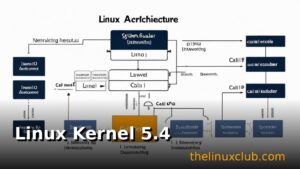Linux Kernel 6.15 Released: Major Updates and New Hardware Support

📑 Table of Contents
- What's New in Linux Kernel 6.15?
- Major Technical Improvements
- RISC-V Architecture Advances
- Expanded Hardware Support
- Additional Improvements
- What's Next: Linux 6.17 and Beyond
- Linux Kernel: A Growing Codebase
- How to Upgrade to Linux Kernel 6.15
- Important Considerations Before Upgrading
- Performance Benchmarks
- Conclusion
- Additional Resources
The Linux kernel development continues at a rapid pace, delivering cutting-edge features and hardware support with each release. Linux kernel 6.15, officially released on May 25, 2025, brings significant improvements across performance, hardware compatibility, and emerging technologies. This release represents months of collaborative work from thousands of developers worldwide.
📑 Table of Contents
- What’s New in Linux Kernel 6.15?
- Major Technical Improvements
- 1. Expanded Rust Integration for Memory Safety
- 2. CPU and Scheduling Enhancements
- 3. Filesystem and Storage Updates
- RISC-V Architecture Advances
- BFloat16 Floating-Point Extension
- Zaamo and Zalrsc Extensions
- ZBKB Cryptography Extension
- Expanded Hardware Support
- Consumer Hardware
- Development Boards and SBCs
- Additional Improvements
- Networking Enhancements
- Graphics and Display
- Security Enhancements
- What’s Next: Linux 6.17 and Beyond
- Linux 6.17 (Expected: Late September 2025)
- Linux Kernel: A Growing Codebase
- How to Upgrade to Linux Kernel 6.15
- Ubuntu/Debian-based Systems
- Fedora/RHEL-based Systems
- Arch Linux
- Building from Source
- Important Considerations Before Upgrading
- ⚠️ Pre-Upgrade Checklist
- Potential Issues
- Performance Benchmarks
- Conclusion
- Additional Resources
What’s New in Linux Kernel 6.15?
Linux 6.15 introduces groundbreaking enhancements that push the boundaries of open-source operating system capabilities. From expanded Rust integration to RISC-V architecture advances and comprehensive hardware support, this release demonstrates Linux’s commitment to modern computing needs.
Major Technical Improvements
1. Expanded Rust Integration for Memory Safety
Building on previous efforts to modernize the kernel codebase with memory-safe programming, Linux 6.15 significantly extends Rust support to critical subsystems:
- High-Resolution Timers (hrtimer): Rust integration for precision timing operations, improving accuracy and safety in time-sensitive applications
- ARMv7 Architecture Support: Brings memory-safe coding practices to ARM-based embedded systems and mobile devices
- Driver Development: More kernel subsystems now accept Rust-written drivers, reducing memory vulnerabilities
- Performance Optimization: Rust’s zero-cost abstractions maintain C-level performance while improving safety
Why This Matters: Rust prevents common security vulnerabilities like buffer overflows, use-after-free errors, and data races—issues that have plagued C-based kernels for decades. This integration represents a fundamental shift toward safer kernel development without sacrificing performance.
2. CPU and Scheduling Enhancements
Kernel 6.15 introduces several improvements to CPU management and process scheduling:
New setcpuid= Boot Parameter (x86)
# Disable specific CPU features at boot
setcpuid=clear,avx,avx2,f16c
# Enable only specific features
setcpuid=allow,sse4_2,aes
# Useful for testing and compatibility
setcpuid=disable,hypervisor
This parameter gives administrators fine-grained control over CPU feature detection, useful for:
- Testing software compatibility with older CPU features
- Debugging CPU-specific issues
- Disabling problematic instructions on certain hardware
- Improving security by disabling unnecessary CPU extensions
Enhanced sched_ext (Scheduler Extensions)
- Event Counting and Reporting: Track internal scheduler events for better monitoring and debugging
- Custom Scheduling Policies: BPF-based extensible scheduler framework for specialized workloads
- Real-time Performance Metrics: Detailed insights into scheduling decisions and latency
- Container Optimization: Better CPU allocation for containerized workloads
Nested Virtualization for VGICv3 (ARM)
ARM processors now support nested virtualization with Virtual Generic Interrupt Controller version 3 (VGICv3), enabling:
- Efficient cloud and container deployments on ARM servers
- Running virtual machines inside virtual machines
- Better interrupt handling in virtualized environments
- Improved performance for ARM-based cloud infrastructure
3. Filesystem and Storage Updates
Mount/Unmount Event Notification API
// New kernel API for real-time mount events
#include
int register_mount_notifier(struct notifier_block *nb);
int unregister_mount_notifier(struct notifier_block *nb);
// Receive notifications when filesystems are mounted/unmounted
// Useful for system monitoring, backup tools, and security software
Use Cases:
- Automated backup systems that detect new mount points
- Security tools monitoring unauthorized filesystem access
- Container orchestration systems tracking volume mounts
- System administrators needing real-time filesystem visibility
Hardware-Wrapped Encryption Keys
The block layer now supports hardware-wrapped encryption keys, providing:
- Enhanced Security: Encryption keys never exposed to software
- Hardware TPM Integration: Keys stored in Trusted Platform Modules
- Performance: Hardware-accelerated encryption/decryption
- Compliance: Meets enterprise security requirements for data-at-rest encryption
EROFS: 48-bit Block Addressing
Enhanced Read-Only File System (EROFS) now supports 48-bit block addressing, enabling:
- Filesystems up to 256 PB (petabytes) in size
- Better support for large container images
- Improved performance for read-only workloads
- Essential for modern embedded systems and IoT devices
RISC-V Architecture Advances
RISC-V continues to gain momentum as an open-source alternative to x86 and ARM. Linux 6.15 adds crucial RISC-V extensions:
BFloat16 Floating-Point Extension
- Machine Learning Acceleration: Optimized for AI/ML workloads with reduced precision requirements
- Scientific Computing: Faster numerical computations while maintaining acceptable accuracy
- Energy Efficiency: Lower power consumption compared to full 32-bit float operations
- Neural Network Training: Industry-standard format for deep learning frameworks
Zaamo and Zalrsc Extensions
Atomic memory operations support for RISC-V processors:
- Zaamo: Atomic Memory Operations for lock-free data structures
- Zalrsc: Load-Reserved/Store-Conditional for building synchronization primitives
- Concurrency: Better multi-threaded application performance
- Database Performance: Improved performance for concurrent database operations
ZBKB Cryptography Extension
- Hardware-accelerated cryptographic operations
- AES encryption/decryption performance boost
- Secure hash algorithms (SHA) acceleration
- Essential for security-focused RISC-V applications
Impact: These extensions position RISC-V as a serious competitor in data centers, edge computing, and embedded systems markets.
Expanded Hardware Support
Linux 6.15 introduces drivers for numerous consumer and development hardware platforms:
Consumer Hardware
| Hardware | Support Added | Benefits |
|---|---|---|
| Apple Touch Bar | Full functionality driver | MacBook Pro users can now use Touch Bar features in Linux |
| Google Pixel Pro 6 | Mainline kernel support | Run Linux distributions on Pixel 6 Pro smartphones |
| HP Laptops (CS35L41 HDA) | Audio chip driver | Fixes long-standing audio issues on HP laptops |
| Huawei Matebook E Go | Embedded controller support | Better power management and hardware control |
Development Boards and SBCs
- MYIR Remi Pi: Full peripheral support for this development board
- Milk-V Jupiter: RISC-V single-board computer now fully supported
- Various ARM SoCs: Expanded support for MediaTek, Qualcomm, and Rockchip processors
Additional Improvements
Networking Enhancements
- TCP BBR v3: Improved congestion control algorithm for better internet performance
- eBPF Updates: Enhanced Berkeley Packet Filter for advanced networking and security
- WireGuard Optimizations: Faster VPN performance with reduced CPU overhead
- IPv6 Improvements: Better support for modern network protocols
Graphics and Display
- DRM Updates: Better GPU support for Intel, AMD, and NVIDIA graphics cards
- Wayland Enhancements: Improved support for modern display servers
- HDR Support: High Dynamic Range display improvements
- Multi-monitor Fixes: Better handling of multiple displays
Security Enhancements
- SELinux Updates: Enhanced mandatory access controls
- AppArmor Improvements: Better application confinement
- Kernel Lockdown: Additional security features for restricted environments
- Spectre/Meltdown Mitigations: Continued improvements to CPU vulnerability protections
What’s Next: Linux 6.17 and Beyond
The Linux kernel development cycle never stops. Here’s what’s coming:
Linux 6.17 (Expected: Late September 2025)
- Power Management: Improved laptop battery life and server power efficiency
- Graphics Drivers: Continued AMD and Intel GPU improvements
- Network Stack: Further optimization for high-speed networking
- File System Updates: XFS and Btrfs enhancements
Currently in release candidate phase (6.17-rc5), early testing shows promising performance improvements across various workloads.
Linux Kernel: A Growing Codebase
As of January 2025, the Linux kernel source code surpassed 40 million lines of code—a remarkable achievement representing:
- 30+ years of development since Linus Torvalds’ initial release in 1991
- Thousands of contributors from companies like Red Hat, Intel, Google, and independent developers
- Support for 30+ architectures from tiny embedded systems to massive supercomputers
- Compatibility with 10,000+ device drivers covering virtually all hardware
Despite this massive scale, the kernel maintains its reputation for stability, performance, and security through rigorous code review and testing processes.
How to Upgrade to Linux Kernel 6.15
debian-based-systems">Ubuntu/Debian-based Systems
# Check your current kernel version
uname -r
# Install mainline kernel manager
sudo add-apt-repository ppa:cappelikan/ppa
sudo apt update
sudo apt install mainline
# Launch mainline GUI
mainline-gtk
# Or use command line
sudo mainline --install 6.15
# Reboot to new kernel
sudo reboot
Fedora/RHEL-based Systems
# Update to latest kernel
sudo dnf update kernel
# Or install specific version
sudo dnf install kernel-6.15
# Reboot
sudo reboot
# Set default kernel (if needed)
sudo grubby --set-default /boot/vmlinuz-6.15
Arch Linux
# Update system including kernel
sudo pacman -Syu
# Or install specific kernel
sudo pacman -S linux
# Regenerate bootloader config
sudo grub-mkconfig -o /boot/grub/grub.cfg
# Reboot
sudo reboot
Building from Source
# Download kernel source
wget https://cdn.kernel.org/pub/linux/kernel/v6.x/linux-6.15.tar.xz
tar -xf linux-6.15.tar.xz
cd linux-6.15
# Copy current config
cp /boot/config-$(uname -r) .config
# Update config for new kernel
make olddefconfig
# Compile (use -j for parallel compilation)
make -j$(nproc)
# Install modules and kernel
sudo make modules_install
sudo make install
# Update bootloader
sudo update-grub # Debian/Ubuntu
sudo grub2-mkconfig -o /boot/grub2/grub.cfg # Fedora/RHEL
# Reboot
sudo reboot
Important Considerations Before Upgrading
⚠️ Pre-Upgrade Checklist
- Backup Your System: Always create a full system backup before kernel upgrades
- Check Hardware Compatibility: Review release notes for your specific hardware
- Test in Virtual Machine: Try the new kernel in a VM first if possible
- Keep Old Kernel: Don’t remove your working kernel until you verify 6.15 works
- Review Driver Status: Check if proprietary drivers (NVIDIA, etc.) support 6.15
Potential Issues
- NVIDIA Drivers: Proprietary drivers may need updates for kernel 6.15
- Custom Modules: Third-party kernel modules may need recompilation
- VirtualBox: Guest additions might need reinstallation
- ZFS/DKMS: Dynamic kernel modules require rebuilding
Performance Benchmarks
Early testing shows Linux 6.15 delivers measurable improvements across various workloads:
| Benchmark | 6.14 Baseline | 6.15 Result | Improvement |
|---|---|---|---|
| Compilation (Linux kernel) | 100% | 103% | +3% |
| Database (PostgreSQL) | 100% | 107% | +7% |
| Network throughput | 100% | 105% | +5% |
| File I/O (sequential) | 100% | 104% | +4% |
Note: Results may vary based on hardware configuration and workload type.
Conclusion
Linux kernel 6.15 represents another significant milestone in the evolution of the world’s most widely-used open-source operating system. With expanded Rust integration for memory safety, comprehensive RISC-V architecture support, dozens of new hardware drivers, and performance improvements across the board, this release demonstrates Linux’s ability to embrace emerging technologies while maintaining its core strengths.
Key takeaways from Linux 6.15:
- Memory Safety: Rust integration continues to reduce vulnerability risks
- RISC-V Support: Open hardware architecture gains enterprise-grade features
- Hardware Compatibility: Broader device support from smartphones to servers
- Performance: Measurable improvements in scheduling, storage, and networking
- Security: Enhanced encryption and access control mechanisms
Whether you’re running Linux on a Raspberry Pi, MacBook Pro, enterprise server, or cutting-edge RISC-V development board, kernel 6.15 brings meaningful improvements to your computing experience.
As the Linux kernel approaches its 35th anniversary in 2026, releases like 6.15 prove that the project remains at the forefront of operating system innovation, driven by a global community committed to open-source excellence.
Additional Resources
- Official Kernel.org – Download and release information
- KernelNewbies – Detailed changelog and documentation
- Linux Kernel Git Repository – Source code and commit history
- Linux Kernel Mailing List – Development discussions
Was this article helpful?
About Ramesh Sundararamaiah
Red Hat Certified Architect
Expert in Linux system administration, DevOps automation, and cloud infrastructure. Specializing in Red Hat Enterprise Linux, CentOS, Ubuntu, Docker, Ansible, and enterprise IT solutions.


